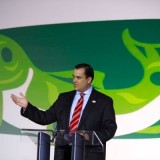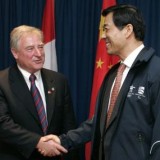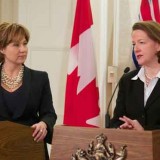Here at The Common Sense Canadian, we have established that the BC Liberals have been doing the bidding of the oil and gas agenda behind the scenes while presenting a different story to the people of BC.
In May, we published “The Myth of Liberal Neutrality on Enbridge”, wherein we outlined how compliant mainstream media had been positioning Christy as “neutral” on the Gateway project, despite the many facts to the contrary, in order to provide a political escape hatch for the languishing Premier. More recently, we have seen precisely why they had taken this “neutral” approach as Christy used the political escape hatch they provided in order to kick off her re-election campaign and make her grand debut as a “fighter for British Columbia”.
Had the mainstream detailed her government’s longstanding, non-wavering support for the oil and gas agenda Christy, would not have been able to suddenly take such a position and maintain any credibility all the while claiming she is now putting BC First.
Last week in a story titled “Cross-Border Deals with Alberta Undermine Clark’s Tougher Stance on Enbridge”, we outlined Christy’s new “BC First” positioning as a hollow and baseless facade, given the Equivalency Agreement her government initiated, which leaves British Columbia without any capacity to review, assess or decide the fate of four major oil and gas infrastructure projects, including Enbridge’s Northern Gateway Project. Moreover, we explained how if Christy was to interfere with the flow of oil and gas across the BC/Alberta border in the way she has publicly described, it would expose British Columbians to millions of dollars in fines and penalties as dictated in legislation her own government ushered in when they invoked closure to bring an end to debate on these important details and passed TILMA/NWPTA into law.
Although mainstream media continues to ignore these inconvenient truths, they have clearly illustrated there are various federal laws which also contribute to the now glaring, unavoidable fact that Christy is powerless to deliver on her new tough stance, has absolutely no leverage to wrestle more cash out of these deals, and cannot prevent the federal government from forcing this agenda on British Columbians. They do so with precise detail here at Ipolitics:
To build a robust and effective national energy economy, Harper will be using Ottawa’s constitutional powers under section 91(2), the regulation of trade and commerce clause, and section 121, preventing the taxation of goods across provincial boarders.
And if that was not enough to neuter Christy and her BC First Liberals, there is even more here from Postmedia, where they outline how Harper can “invoke Clause 10 of Section 92 of the British North America Act, which allows Ottawa to assert jurisdiction over interprovincial projects if parliament declares them to be ‘for the general advantage of Canada’.”
At this point, you are probably asking how can Christy claim to be standing up for the rights of British Columbians when her government has signed them all away? Or how can she threaten to stop anything when she has no legal capacity to do so? And how can she possibly ask for more money? She has not a single bargaining chip or any leverage whatsoever as a result of her government’s own actions and the plethora of federal legislative tools designed specifically to stop her from doing so.
The answer is EPIC.
Of course all of this occurs during the height of summer vacation season and at the same time as the spectacle of the Olympics. The few of us left still paying attention have been inundated with a barrage of minutia and detail covering Christy’s tough new stance. We have been literally overwhelmed with all sorts of talk about “Premier Redford’s National Energy Strategy” and how Christy will not “sign off” until her so-called “demands” are met.
Nowhere in all the coverage is there even one mention of the man behind the curtain, David Emerson, the EPIC Chairman and political puppet master who infamously crossed the floor to join Stephen Harper’s Conservatives as Minister of International Trade and Minister for the Pacific Gateway, before returning to the private sector in 2008 to work for the China Investment Corporation. EPIC is the Energy Policy Institute of Canada, the organization building the Energy Strategy “Framework” on behalf of a variety of our corporate overlords. The evidence of EPIC’s ability to dominate the agenda was prominent during Harper’s Omnibus disaster where most of what Bill C-38 entailed was written and published by EPIC months before.
This is where we get down to brass tacks.
Redford, Christy and even Harper are political bit players in a much bigger game.
EPIC represents a stunning array of who’s who in the corporate realm that dominates the Canadian landscape and David Emerson is the corporate titan calling the shots from the EPIC command and control center. In fact, he is quite possibly the most powerful man in Canada. Emerson’s long corporate career has stretched his network the world over. He is plugged into Asia in a bold and very public way, but less public are his far-reaching contacts in all of our country’s most important industries outside of banking, not to mention his rolodex of political contacts from his bold stint in public office.
Our current politicians work for EPIC – their job is to grease the skids, do damage control and generally ensure public acquiescence to the EPIC agenda.
Most people are unaware of EPIC. They operate behind the scenes, which also mirrors the now longstanding BC Liberal management of the agenda. It’s all done out of the limelight, away from the public eye. No stone is left unturned and no detail is overlooked by this immensely bold and powerful lobby.
Let’s take a look at their most recent “statement” – note it is not a press release or an opinion piece or even an attempt to influence the “all-powerful” politicians, but rather it is simply a plain statement of the facts, with very bold language that dictates the entire agenda, and although it was publicly released, it was never reported on. Moreover, as you will note, this statement gave the premiers their marching orders and priorities, and even detailed what they must say:
“The Premiers must speak in terms of what is in it for every Canadian.”
When you read between the bold lines it becomes very clear precisely how and why Redford is now standing up to protect “every penny” of her Province’s royalties, while Clark was suddenly able to stop being neutral and start talking about “what is in it” for British Columbians.
But it does not stop there – the EPIC statement goes on to dictate the policy procedure and the roll-out while explaining how they will be “sending to every Premier, the Prime Minister and all Ministers responsible for energy, our recommendations and discussion on key elements for a national energy framework.”
The statement then proceeds to outline their expectations of the lowly premiers and underscores the need for them to “act fast.”
And then there is this gem:
If we fail, we lose as a nation and we give up the jobs, money and environmental management opportunity to other countries that will gladly compete with us.
According to EPIC, other countries will “gladly” accept the “environmental management opportunity” the massive escalation of Tar Sands extraction and natural gas fracking presents.
Really? Environmental Management Opportunity? Well, I guess that is one way of putting it. The day after they released this statement the good folks in Wisconsin had one of their own “Environmental Management Opportunities” as Enbridge’s most recent pipeline spill released an “estimated” 1200 barrels of oil. On that same day Enbridge received approval to reverse line 9b in their “strategy” to move Alberta’s Dilbit east into Portland, Maine for export, offering a whole new region more “Environmental Management Opportunities.”
This all coincides with our Energy Minister’s taxpayer funded junket to London (one of the destinations for exported dilbit from Portland), to meet with his old buddy Gordon Campbell, who arranged yet another “energy meeting” – this one coinciding with the Olympic kick-off and, as it just so happens, Coleman’s vacation schedule. However, Coleman is bound under confidentiality agreements with the likes of Shell and Petro China, so it is unclear exactly what he will be able to discuss with Mr. Campbell and Premier Redford, except for the fact that those companies just applied for an export license (on the very same day as the Enbridge spill and Christy’s debut as tough new fighter for BC – what you missed it?) to ship 1 million tonnes a year of LNG for 24 years.
That is one hell of a lot of Fracking natural gas and it all makes you wonder what’s left to strategize about. In fact, if Christy was serious about talking money for British Columbia, this is what she should be talking about while ensuring BC sees a respectable royalty regime in place for this massive liquidation of our resources.
Regardless, the EPIC statement below goes onto explain how they will be “helping” out governments by “releasing comprehensive details for the roll out of the national energy strategy”, which will dictate “how governments will implement their role in the strategy.”
In case you are wondering, this is what a petro-state looks like. Corporations drive the agenda and politicians comply while distracting people from the real issues and deflecting attention away from the things that matter. All the while twisting the narrative to improve their electoral fortunes. This is what we now deem good “leadership” in today’s petro-political environment.
Read the full EPIC statement here
Now you know why Ms Clark’s tough new stance is not only hollow and meaningless but EPICly duplicitous.
She is simply doing what she is told and all she has to do is continue her government’s complete capitulation to the agenda and she will overcome all the laws and restrictions that render British Columbia powerless to negotiate better returns. She will do so with her continued passive compliance – not a “tough stand” – and she will be rewarded by Emerson, who will give the nod for more money to be loosened up while ensuring the corporations he represents meet her “demands”, as unsubstantial and meaningless as they are.
This is how Christy Clark puts BC First, right behind EPIC, and a multitude of now longstanding agreements that limit the Province’s ability to realize responsible returns on our resources.






